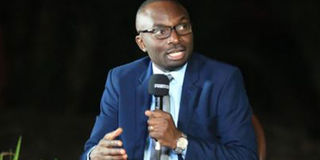Studied approach can help African stoppers break the proverbial glass ceiling in Europe

Author: Robert Madoi is a sports journalist and analyst. PHOTO/FILE/NMG.
What you need to know:
Lest we forget, feed-good stories don’t exclusively belong to the past. The here and now has an air of promise around it. Somewhat predictably, Cameroon’s penchant for producing world class stoppers has shone through.
For most – if not all – African footballers, cracking the code in Europe’s top five leagues is a tough grind. The sheer scale of the difficulty has over time registered most glaringly in the goalkeeping department. That this continues to be the case is extremely worrying. To compound matters, there appears to be no guarantee of a benign outcome in the near future.
Or maybe not. Fair enough, the goalkeeping position is traditionally unforgiving, punishing – as it so often does – any whiff of a mistake. Good goalkeepers, even at a tender age, are expected to showcase the stoicism of a veteran. They must bear with broad shoulders and sophistication disappointments.
To claim that African goalkeepers are incapable of ticking the previously mentioned boxes is an unhelpful generalisation. Whereas concluding that African stoppers are the envy of the world would be an almighty stretch, it’s not always been doom and gloom.
Such was the cult of the likes of Thomas N’Kono, Joseph-Antoine Bell, Jacques Songo’o, and Idriss Carlos Kameni that they figured between the sticks in Spain’s top division with astonishing regularity.
The commanding position Songo’o assumed was such that in 1997 he became the first non-European to win the Zamora Trophy. The accolade is handed to the goalkeeper with the lowest goals-to-games ratio in Spain’s topflight. Songo’o was the cornerstone in a sturdy Deportivo La Coruña defence during the 1996/1997 season, giving away a measly 28 goals in 37 matches.
The Cameroonian converted individual success to team glory in the 1999-2000 season when Depor surprised Spain – and indeed themselves – by going all the way.
Lest we forget, feed-good stories don’t exclusively belong to the past. The here and now has an air of promise around it. Somewhat predictably, Cameroon’s penchant for producing world class stoppers has shone through.
Blood cousins André Onana and Fabrice Ondoa have well and truly earned their stripes. Barring a disaster with catastrophic consequences, they should continue to cover themselves in glory for years to come.
But this is far from being a Cameroon thing. At the time of writing this op-ed piece, English outfit Chelsea were strongly linked with Senegalese net-minder Édouard Mendy. If the deal doesn’t fall through, the much-maligned art of African goalkeeping will have itself an unlikely badge of honour.
That said; the resilience that French-born Mendy has exhibited is not limited to an African character trait. The common accusation that a sizeable number of African stoppers cave in too easily is unfortunately merited.
There are other acute concerns that need to be decisively addressed. Uganda, which has a decent track record as a breeding ground for good stoppers (think Jamil Kasirye pushing Paul Ssali at the back end of the 1970s; Mike Mukasa having Sadiq Wassa look over his shoulders in the early 1990s; Hussein Ssali and Sam Kawalya taking turns in goal in the late 1990s; the emergence of Denis Onyango, Robert Odongkara and Jamal Salim Magoola in the noughties), ought to take heed of the acute concerns.
For starters, there is a laughable casualness when it comes to grooming goalkeeping coaches. This places emerging goalkeepers on a slippery slope. Many of them soon discover to their utter shock that they have to unlearn to relearn even the most basic of best practices. The role of goalkeepers has evolved to the point of them being asked to sweep as well as take part in their teams’ attacking build-up play.
The only way in which African stoppers are going to meet these increased demands is if respective FAs show a robust appetite for training trainers. There’s a lot of work to be done. Matters cannot be left to chance as is currently the situation.




